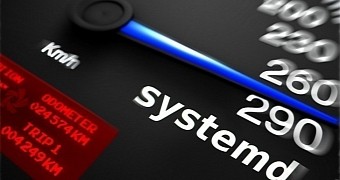The systemd developers, through David Herrmann, have had the pleasure of announcing the immediate availability for download of the systemd 226 open-source init system for GNU/Linux distributions.
According to the release notes, which we've attached at the end of the article for reference, systemd 226 is a small yet important release that adds several new features to the DHCP (Dynamic Host Configuration Protocol) implementation of the systemd-networkd component.
Among these, we can mention support for emitting NTP (Network Time Protocol) and DNS (Domain Name System) information, as well as the ability to transmit and receive timezone information, and support for configuring lease timeouts via the "DefaultLeaseTimeSec=" and "MaxLeaseTimeSec=" options.
Additionally, the overall stability of leases has been improved, and there's now support for two new configuration options, "PoolSize=" and "PoolOffset=", which can be used to control the lease address pool metrics.
"As usual, many bug-fixes and cleanups, but also a rather large set of new features this time, including support for unified cgroups, many DHCP improvements, extensions to the polkit integration, nspawn configuration files, and many more," says David Herrmann.
systemd now supports Linux kernel's "unified" control group hierarchy
systemd 226 also adds support for configuring the encapsulation limit of tunnels in the systemd-networkd component via the "EncapsulationLimit=" option, support for predictable interface names for virtio devices in systemd-networkd, and support for the newly introduced "unified" control group hierarchy of the Linux kernel.
Last but not least, systemd 226 introduces a brand new scope unit called init.scope that can encapsulate PID 1 of the system, adds support for filtering out kernel threads in the cgtop tool, adds the ability to replace session buses with user buses, and implements support for .nspawn settings files in the systemd-nspawn component.
Additional fields will now be added to the systemd's requests for PolicyKit decisions during management of units, support for dequeuing real-time signals has been added to the "sd-event" event loop API (Application Programming Interface) of libsystemd library, which has also gained two new calls, and it is now possible to create non-recursive bind mounts using systemd-nspawn's "--bind-ro=" and "--bind=" options.
Download systemd 226 right now from Softpedia.

 14 DAY TRIAL //
14 DAY TRIAL //